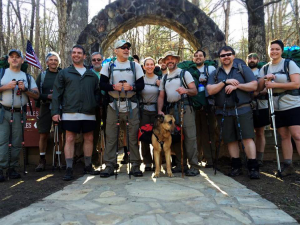 Back in the old days, before transportation became so efficient, soldiers returning home from the battlefield would have to make the long journey back on foot. Although often a grueling journey, this gave them time to decompress and process their experiences. “Active hiking gave soldiers an opportunity to come to terms with any trauma they may have faced while on active duty,” says Sean Gobin. “This is the opportunity that Warrior Hike’s ‘Walk off The War’ program gives army vets.”
Back in the old days, before transportation became so efficient, soldiers returning home from the battlefield would have to make the long journey back on foot. Although often a grueling journey, this gave them time to decompress and process their experiences. “Active hiking gave soldiers an opportunity to come to terms with any trauma they may have faced while on active duty,” says Sean Gobin. “This is the opportunity that Warrior Hike’s ‘Walk off The War’ program gives army vets.”
An inspired hike
Gobin had just completed three tours, two in Iraq and one in Afghanistan, and had finally returned home in 2012 for good. He was set to begin college later that year and decided to take off on a hike along the 2,185 mile Appalachian Trail. “I had just returned from Afghanistan and had five months before going off to college,” recalls Gobin. “I had always wanted to hike the Appalachian Trail. When I heard about the fundraiser for army vets, I thought it was a great opportunity to fulfill my dream while doing something good for other vets.”
Two-thirds of the way through the hike, Gobin had an epiphany. “The hike was so much more than I thought it would be,” says Gobin. “It was transformational for me. I wanted other veterans to have the same therapeutic experience. I decided there and then that I wanted to help other veterans.”
Gobin founded the Warrior Hike ‘Walk Off the War’ program in 2012. The program’s first year of operation in 2013 saw 14 veterans hike the Appalachian Trail. The program expanded to include the Pacific Crest Trial and the Continental Divide Trail in 2014. This year (2015), the program will support about 30 vets to hike six different trails including the Florida and Ice Age Trails. 2015 will also see the addition of a paddling trip that will take participating vets all the way down the Mississippi.
More than just a hike
The hikes are not all about walking. “The hikes help the veterans establish bonds with other soldiers who have gone through what they’ve gone through,” says Gobin. Their experiences on the hikes help them re-socialize. They’re better able to return to ‘normal society’.
The hikers are supported by volunteers along the trail who offer free accommodation and dinners for the evening. The vets are, therefore, able to do their laundry, shower and have a good home-cooked meal in good company while on the trail. “Some of the vets have seen the worst side of humanity,” says Gobin. “The exposure they get on the hikes helps them rekindle a respect for humanity. They’re able to see the good side of humanity once more.”
